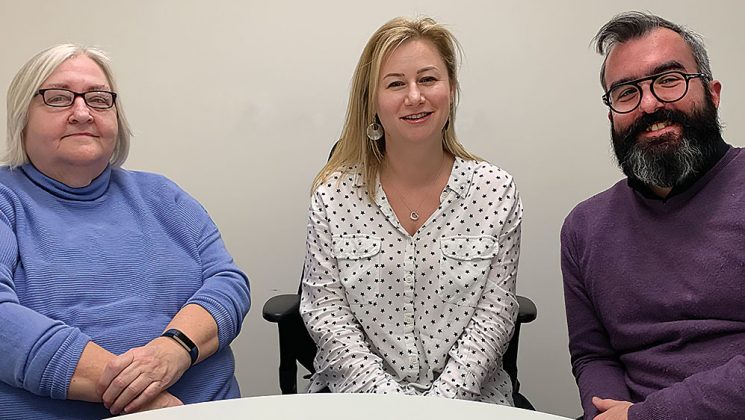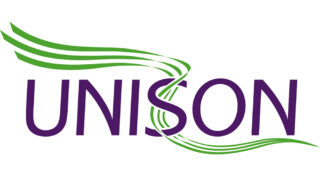“I’ve been going around to regions and conferences saying this is the most important vote in a generation,” says Josie Bird, UNISON’s president.
“The only difficulty with that statement is that we have said it about the last two or three elections, but they do seem to get more important each time.”
She’s sitting around a table with her vice presidents, Sian Stockham and James Anthony, discussing the UK’s forthcoming trip to polling stations.
“Austerity has more impact each time and if we get a Tory majority, then with the lurch to the right we’ve already seen, we’re going to see even more – and if we really ended up with a five-year, fixed-term Parliament, can you imagine the damage that they would do?” she asks. Everyone nods.
“It feels to me that since austerity, public service workers like us have felt all the pressure,” adds James. “We know the cracks are starting to show, but we’ve done an amazing job of pasting over them for the public.
“I think there’s a very real feeling that, if it continues, like this, services will collapse.
“People have already started seeing waiting times for A&E and operations increase. Standards of care will drop because there won’t be enough nursing staff.”
“Austerity has more impact each time and if we get a Tory majority, then with the lurch to the right we’ve already seen, we’re going to see even more.”
President Josie Bird
Sian notes that the community and voluntary sector relies on funding from local government.
And with central government having slashed funding to local government, councils “are going to stop that soon, because they’re going to want to concentrate on funding their own work first, before they give out to others. A lot of community and voluntary projects are closing already”.
Pensions is another concern for her. “Being a woman of the ’50s, the pensions – that’s a big issue and I think the Labour manifesto is brilliant!
“Because I’m a job blocker,” she says bluntly. “I’ve got to work at the moment ’cos I haven’t got my pension, so for young people – give this old fogey her pension and she can be gone!”
Indeed, of the women and equalities section in Labour’s manifesto, Sian says it’s “sounding so positive”, while she’s also happy that proposals have all been costed.
James also sees other positives in the manifesto, saying that it’s “potentially transformative about adult education.
“The headlines are about free university tuition, but what I think is more transformative is about free adult education.
“For some of our members, they’re just keen to get on, maybe get a better job, expand their horizons, retrain – they’ve done one job and they want a new challenge.”
The ability to access free education from a local further education college is also important, he continues – particularly as it’s now being said that “everyone will have lots of different careers in our lives,” with increasing automation one factor in that.
“I know teachers who take bread in and make toast for pupils who are coming in to school who haven’t had breakfast.”
Vice president Sian Stockham
“The fact that Labour has recognised that and that free education shouldn’t just be about people who can go to university – that it should be about free adult education, across the generations, across the workforce … I think that could transform people’s expectations and life chances.”
Indeed, as Josie notes: “the only option for people in terms of further education for adults in recent years has been through trade unions and the Union Learn Fund”. But that’s limited in what it can deliver – a factor that illustrates why Labour’s plans could be really important.
For Josie herself, what’s most pressing is “early years.”
“Sure Start,” observes Sian, nodding in agreement.
“Sure Start, yes,” continues Josie, “and the investment in nurseries and primary schools. For me, it dovetails with things like social care.
“This genuinely scares me. At the moment, the pastoral care in schools has been eroded away, so children can slip through the cracks much, much easier in terms of safeguarding and child protection.
“You just don’t have the same number of people who are keeping an eye on children, who see if their behaviour is changing, unusual circumstances, things coming up. And then, because all of social care prevention and early intervention services have been eroded, all you’ve got left is the statutory element of social care now, which really is the intensive crisis type of intervention.
I think there’s a very real feeling that, if it continues, like this, services will collapse.
Vice president James Anthony
“School is about more than education … it’s that whole package that comes with it. And for children who are living a little bit more precariously, they’re really in danger of being failed, because of everything that’s been stripped out.”
Sian notes that she knows “teachers who take bread in and make toast for pupils who are coming in to school who haven’t had breakfast.
“I see things on the telly about the States and you think: ‘that could never happen here’ and then you hear about teachers buying books and pens for children in their classes so that they can participate at school.
“What are we coming to?”
James points out that “one of the real achievements of the last Labour government was to reduce child poverty,” yet that’s now in reverse.
“Ricketts is coming back,” adds Sian “and that went out with the Ark …”
Of that increasing child poverty, James makes the point: “the impact that that will have on them for the rest of their lives – and the impact that it will have on the country for the rest of their lives – is huge.
“We’ve got one chance to change that – and that’s on 12 December.”
UNISON president Josie Bird is a local government worker from Newcastle. Sian Stockham is a support care worker from Abergavenny and James Anthony is a nurse specialist in Birmingham.


